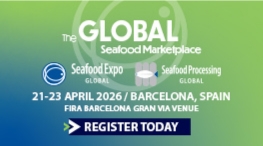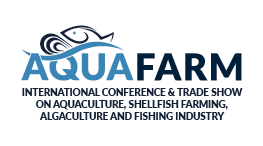The storefront of Išlaužo žuvis’s boutique-inspired fish shop.
In Lithuania, a new trend has emerged in the way that aquaculture production is sold to consumers: a few local fish farmers and processors have opened their own retail outlets to sell their products. These specialty shops enable the producers to sell fish directly to consumers, bypassing the typical distributors of supermarkets or fishmongers. Three such businesses who have practiced this retail strategy are JSCs Išlaužo žuvis, Kintai, and Vasaknos. These firms established their shops in response to the growing desire for fresh, local fish shown both in Lithuania and in other EU countries.
Creating a direct-distribution model for fresh fish
The Lithuanian aquaculture sector has continued to experience growth, with the vast majority of production coming from pond aquaculture. The predominant species continues to be the common carp, though sturgeon, rainbow trout, bighead carp, and grass carp are also farmed. Market observations have shown that consumers prefer fresh fish, as well as fish products that can be prepared more quickly and easily. These companies have found a niche market for their fresh, natural fish. The new retail enterprises cater to those customers who are moving away from large stores, and back to smaller specialty shops that can provide a variety of local fish products.
In southern Lithuania, Išlaužo žuvis owns two shops that sell its own production, which includes various kinds of carp, sturgeon, catfish, pike, perch, trout and eel. The shop design was inspired by the idea of a cosy and small fish “boutique,” and the shops offer over 200 culinary products, including fish rolls and fish steaks. The available assortment of fish covers the range of smoked fish (cold and hot), fish culinary products, and fresh fish on ice. Kintai is a processing factory that processes as much as 500 tons of fish, both its own fish and that which is purchased from other producers. It grows species including carp, grass carp, trout, and sturgeon, and sell fresh, smoked and salted fish. Kintai currently has five shops in small towns in western Lithuania (Šilutė, Kintai, Šilalė, Tauragė and Telšiai), each towns with approximately six to thirty thousand inhabitants. Finally, the company Vasaknos has been processing its own sustainable aquaculture production since 2015. It provides fresh and smoked fish in its shops, and also fulfils special production requests from clients.
An emphasis on close customer relationships
One advantage that these shops have is that they foster unique relationships between producer and consumer, which are missing if fish are purchased from large supermarkets. Many of the shops’ clients are local, though the regions do attract tourists and some of the production is exported. The shops emphasize the fresh taste of their fish, and seek to provide customers with personal attention to create a warm atmosphere. Customer interaction is quite important to these businesses. Išlaužo žuvis, for example, further builds positive relationships through its participation in local fairs, holidays, and events, which also provide an opportunity to tell the public about its unique production process of preservative-free fish.
The strategy of these businesses relies upon their idea that if they offer quality products and welcoming service, customers will return with additional business. Thus, a major way that the businesses promote their products is simply through word-of-mouth; they depend upon satisfied customers to spread the word and increase sales. Yet they also make use of other channels to raise awareness about their products. Vasaknos uses methods including distributing signs, stickers, promotional booklets, and stands in the local area. For Kintai, its small-town locations make positive customer feedback perhaps the most valuable marketing tool. Yet it also puts out advertisements in local newspapers, distributes leaflets, organizes tasting events, and orders commercials on local radio stations. The company furthermore utilizes social networks like Facebook, as well as Google AdWords.
| Aquaculture production in Lithuania | ||||||
| Volume (tonnes) | Value (million euro) | |||||
| 2012 | 2013 | 2014 | 2012 | 2013 | 2014 | |
| Common carp | 3,256,88 | 3,751,09 | 3,306,22 | 6,54 | 7,57 | 6,78 |
| Catfish | 13,22 | 41,46 | 60,20 | 0,06 | 0,17 | 0,35 |
| Crucian carp | 40,87 | 29,30 | 32,81 | 0,04 | 0,03 | 0,03 |
| Eel | 3,45 | 3,47 | 7,15 | 0,08 | 0,09 | 0,06 |
| Grass carp | 0,00 | 0,00 | 8,64 | 0,00 | 0,00 | 0,02 |
| Pike | 23,86 | 36,58 | 46,74 | 0,09 | 0,17 | 0,22 |
| Pikeperch | 0,17 | 1,85 | 1,94 | 0,00 | 0,06 | 0,05 |
| Silver carp | 23,34 | 52,25 | 97,15 | 0,06 | 0,16 | 0,29 |
| Sturgeon | 55,36 | 115,76 | 72,80 | 0,28 | 0,67 | 0,37 |
| Tench | 4,50 | 11,12 | 12,95 | 0,02 | 0,08 | 0,08 |
| Trout | 114,56 | 115,12 | 109,48 | 0,36 | 0,37 | 0,44 |
| White grass carp | 40,84 | 52,69 | 87,62 | 0,12 | 0,14 | 0,26 |
| Others* | 4,84 | 0,25 | 0,98 | 0,02 | 0,00 | 0,01 |
| Total | 3,581,89 | 4,210,92 | 3,844,67 | 7,66 | 9,51 | 8,96 |
Producers have observed increased sales and seafood consumption
Over the last five years, sales of many fish species have increased due to growing demands from Lithuanian consumers and the high quality of available products. While Išlaužo žuvis, Kintai, and Vasaknos have only opened their shops somewhat recently, they consider their businesses to be expanding, and the demand for their products growing. The new shops are starting to comprise more significant shares of the businesses’ sales. Išlaužo žuvis, for instance, sells most of its production either in its shops or in production stands in the ecological markets. It has also reached its goal of processing one-third of its own grown fish in its fish processing line and culinary factory. Kintai’s shops are still new, and thus it is difficult to determine precisely their revenue; yet the business plans to increase its overall sales to 1,2 million euros per year, from the current sales of 600-700 thousand euros per year. It hopes to have its sales be made up equally of live production and process production. For Vasaknos, the sales from its shops and mobile shops make up the vast majority of their processed production sales: approximately 90 percent. Processed production, in turn, amounts to 10 to 15 percent of the company’s overall sales. While most firms could not comment on the pricing of their products, as they consider them to be unique products that are unlike those which are marketed at large stores, Vasaknos stated that the shops’ price of production is lower than that in supermarkets, as there is a mark-up.
In addition, the companies note that the existence of these kinds of shops will contribute t
o increasing the consumption of fish and seafood, especially locally. Local fish had declined in popularity due to the prominence of imported fish, but a shift in consumer tastes toward sustainability and freshness has increased demand for fish sourced from nearby. Some of the shops that were established in small towns were the first specialty fish sellers in the area, reaching more customers and opening up new markets for fish to be sold.
Shops provide firms greater flexibility in products and prices
The shops are able to provide very fresh fish given the shortened supply chain, and the direct communication between producers and final consumers has its advantages. Customers can hear about the production process, as well as provide immediate feedback on the products’ taste and quality straight to the producers. This allows the shops to be more flexible and experimental in the products they offer, and more quickly responsive to consumer demand. There is also greater freedom in determining their prices, which could be difficult to do when negotiating with large, powerful retailers. The firms pride themselves on the knowledge they share with buyers regarding the production processes, and the network of loyal customers that they have been able to create.
There are still challenges to overcome in the expansion of these businesses, though. Due to the small, regional nature of the shops, they are not readily accessible for people who live outside their general vicinity. The shops have tried to compensate for this by selling their products in popular markets. In addition, the responsibilities of shop management and administration are now left up to the companies; they must also pay for the promotion of their products, which can be costly and sometimes not even effective.
Expanding into eateries and greater product variety
The future of these businesses is planned to include further sales growth, as well as the opportunity to diversify products by partnering with retailers of other goods. In the shops of Išlaužo žuvis, customers can already buy beer or natural bread from its partner producers. Išlaužo žuvis has plans to open a fish restaurant with a professional chef, who will create meals showcasing the local fish. After Kintai completes its first year in business, it hopes to work with other companies, and also has plans for a fish café or restaurant. Kintai is currently involved with the tourism industry, and can potentially supply its fish to a restaurant and hotel along the river Minija. Furthermore, a new fish shop is in development, which would open in Vilnius in August. Vasaknos currently only sells its own products, but it too is interested in expanding to an eating establishment. It has discussed opening a fish bistro close to its shops, as well as perhaps a culinary manufacturer.
Reaching the online market is also a possibility that has been discussed. Kintai is working on selling its products online, perhaps for next year. Išlaužo žuvis prefers direct interaction with its customers, though, and maintains that the personal interaction is what sets these businesses apart from their bigger competitors. The owners of Išlaužo žuvis believes that the variety and quality of shops such as their own will make them more popular in the future. Consumers have demonstrated a desire for greater knowledge about the origins of their food, including how a fish was bred and its special characteristics; smaller retailers are uniquely suited to providing such detail. A growing inclination for healthy eating in Lithuania, as well as increasing purchasing power, should benefit the continued growth of such shops.
Katie Duggan, Eurofish
katie@eurofish.dk









